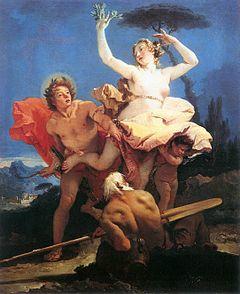| Dafne | |
|---|---|
| Opera by | |
 Daphne Chased by Apollo, by Giovanni Battista Tiepolo, 1744 | |
| Librettist | Ottavio Rinuccini |
| Language | Italian |
| Based on | Daphne myth |
| Premiere | 1598 Palazzo Corsi, Florence |
Dafne is the earliest known work that, by modern standards, could be considered an opera.[1][2][3] The libretto by Ottavio Rinuccini survives complete; the mostly-lost music was completed by Jacopo Peri, but at least two of the six surviving fragments are by Jacopo Corsi. Dafne was first performed during Carnival of 1598 (1597 old style) at the Palazzo Corsi.[4]
History
Dafne is scored for a much smaller ensemble than Claudio Monteverdi's slightly later operas, namely, a harpsichord, a lute, a viol, an archlute, and a triple flute.[5] Drawing on a new development at the time, Peri established recitatives, melodic speech set to music, as a central part of opera.[6]
The story of Apollo falling in love with the eponymous nymph, Daphne, the opera was written for an elite circle of humanists in Florence, the Florentine Camerata, between 1594 and 1597, with the support, and possibly the collaboration, of the composer and patron Jacopo Corsi.[6][7] An attempt to revive Greek drama,[5] according to modern scholarship, it was a long way off from what the ancient Greeks would have recognized.[6]
Most of Peri's music has been lost, despite its popularity and fame in Europe at the time of its composition, but the 455 line verse libretto was published and survives. Florence's ruling Medici family was sufficiently taken with Dafne to allow Peri's next work, Euridice, to be performed as part of Marie de' Medici and Henry IV's wedding celebrations in 1600.[8][9]
See also
- La Dafne (Gagliano), 1608
- Dafne (Opitz–Schütz), 1627
References
- ^ Sonneck, O. G. (1913). ""Dafne", the First Opera. A Chronological Study". Sammelbände der Internationalen Musikgesellschaft. 15 (1): 102–110. JSTOR 929391.
- ^ "How the Quest Was Won: OPERA (21/10/2005)". ABC. Archived from the original on 19 May 2006. Retrieved 7 August 2007.
- ^ "Travel Advisory; Opera's 400th Birthday Is Celebrated in Vienna". The New York Times. 3 May 1998. Retrieved 7 August 2007.
- ^ Edmond Strainchamps, "Corsi, Jacopo" in New Grove.
- ^ a b Otten, Joseph (1911). Catholic Encyclopedia. New York: Robert Appleton Company. Retrieved 7 August 2007.
- ^ a b c Jacopo Peri – Dafne page
- ^ Porter, William V. (1965). "Peri and Corsi's Dafne: Some New Discoveries and Observations". Journal of the American Musicological Society. 18 (2): 170–196. doi:10.2307/830682. JSTOR 830682.
- ^ "Music to the ears". news.com.au. 27 November 2006. Archived from the original on 4 June 2011. Retrieved 7 August 2007.
- ^ "Opera Before Gluck". Music With Ease. Retrieved 7 August 2007.
External links
- Libretto with translation at HOASM
- The Starry Messenger by Justin Fleming, a play about the first production of Dafne